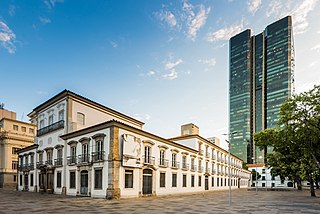
Rio de Janeiro, or simply Rio, is the capital of the state of the same name, and the second most populous city in Brazil, after São Paulo. Listed by the GaWC as a beta global city, Rio de Janeiro is the sixth most populous city in the Americas. Part of the city has been designated as a World Heritage Site, named "Rio de Janeiro: Carioca Landscapes between the Mountain and the Sea", on 1 July 2012 as a Cultural Landscape.

Rio de Janeiro is one of the 27 federative units of Brazil. It has the second largest economy of Brazil, with the largest being that of the state of São Paulo. The state, which has 8.2% of the Brazilian population, is responsible for 9.2% of the Brazilian GDP.

Niterói is a municipality in the state of Rio de Janeiro, in the southeast region of Brazil. It lies across Guanabara Bay, facing the city of Rio de Janeiro and forming part of the Rio de Janeiro Metropolitan Area. It was the state capital, as marked by its golden mural crown, from 1834 to 1894 and again from 1903 to 1975. It has an estimated population of 515,317 inhabitants (2020) and an area of 129.375 km2 (49.952 sq mi), making it the fifth most populous city in the state. It has the highest Human Development Index in the state and the seventh highest among Brazil's municipalities in 2010. Individually, it is the second municipality with the highest average monthly household income per capita in Brazil and appears in 13th place among the municipalities of the country according to social indicators related to education. The city has the nicknames of Nikiti, Nicki City and the Smile City (Cidade Sorriso).

The Tijuca National Park is an urban national park in the mountains of the city of Rio de Janeiro, Brazil. The park is part of the Atlantic Forest Biosphere Preserve, and is administered by the Chico Mendes Institute for Biodiversity Conservation (ICMBio).
Carioca is a demonym used to refer to anything related to the City of Rio de Janeiro, in Brazil. The original meaning of the term is controversial, maybe from Tupi language "kari' oka", meaning "white house" as the whitewashed stone houses of European settlers or even the colonists themselves, by merging "kara'iwa" and "oka" (house). Currently, the more accepted origin in academia is the meaning derived from "kariîó oka", which comes from the indigenous tupi "house of carijó", which was Guaraní, a native tribe of Rio de Janeiro who lived in the vicinity of the Carioca River, between the neighborhoods of Glória and Flamengo.
Maracanã most commonly refers to the Maracanã Stadium in Rio de Janeiro, Brazil. It may also refer to:
The term City of God may refer to The City of God, a fifth-century book by St. Augustine of Hippo, and subsequently to the Roman Catholic Church and its unity with civil power, such as existed between it and the Holy Roman Empire in the Middle Ages.
Rio Branco or Río Branco may refer to:
Jardim Botânico, Portuguese for botanical garden, may refer to:
Rodrigo Fabiano Mendes, or simply Rodrigo Mendes or Rodrigo, is a Brazilian former left winger, he last played for Novo Hamburgo, formerly played for Fortaleza who was released on 5 June 2009 due to successive muscular problems on both tights.
Universidade Candido Mendes is a private university located in Rio de Janeiro, Brazil. It is Latin America's oldest private university.
Glória is a common Portuguese girl's name, the equivalent of Gloria in Spanish and English. It may also refer to:

Marco Aurélio Mendes de Farias Mello is a Brazilian former justice of the Supreme Federal Court of Brazil, appointed to the position by his cousin, former President of Brazil Fernando Collor de Mello.
Cândido Mendes may refer to:
This page is based on this
Wikipedia article Text is available under the
CC BY-SA 4.0 license; additional terms may apply.
Images, videos and audio are available under their respective licenses.






